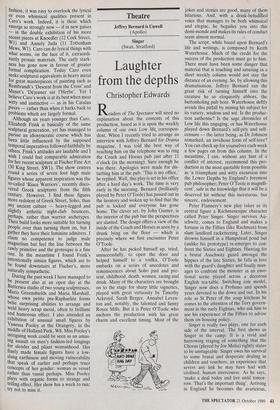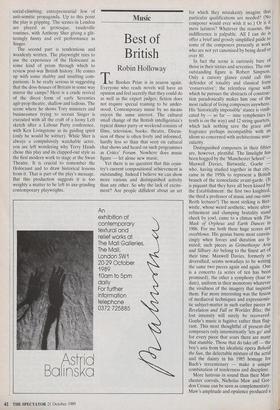Theatre
Jeffrey Bernard is Unwell (Apollo) Singer (Swan, Stratford)
Laughter from the depths
Christopher Edwards
Readers of The Spectator will need no explanation about the contents of this production, based as it is upon the weekly column of our own Low life. correspon- dent. When I recently tried to arrange an interview with Jeffrey Bernard for Drama magazine, I was told the best way of reaching him on the telephone was to ring the Coach and Horses pub just after 11 o'clock (in the morning). Sure enough he was there. Apologies were made for dis- turbing him at the pub. 'This is my office,' he replied. Well, this play is set in his office after a hard day's work. The time is very early in the morning. Bernard (brilliantly played by Peter O'Toole) has passed out in the lavatory and woken up to find that the pub is locked and everyone has gone home. The clever set, by John Gunter, is the interior of the pub but the perspectives are slanted. The design offers a view of the inside of the Coach and Horses as seen by a drunk lying on the floor — which is precisely where we first encounter Peter O'Toole.
After he has picked himself up, tried, unsuccessfully, to open the door and helped himself to a vodka, O'Toole embarks on a series of anecdotes and reminiscences about Soho past and pre- sent, childhood, death, women, racing and drink. Many of the characters are brought on to the stage for sharp little vignettes, played with great virtuosity by Timothy Ackroyd, Sarah Berger, Annabel Leven- ton and, notably, the talented and funny Royce Mills. But it is Peter O'Toole who anchors the production with his great charm and excellent timing. Most of the jokes and stories are good, many of them hilarious. And, with a drink-befuddled voice that manages to be both whimsical and elegiac, he beguiles you into this demi-monde and makes its rules of conduct seem almost normal. • The script, while based upon Bernard's life and writings, is composed by Keith Waterhouse. Much of the credit for the success of the production must go to him. There must have been some danger that material that is touching and amusing in a short weekly column would not stay the distance of an evening. So, by allowing this dramatisation, Jeffrey Bernard ran the great risk of turning himself into the creature he so eloquently abhors, the buttonholing pub bore. Waterhouse deftly avoids this pitfall by mining his subject for its variety, wisdom and wit. Is the produc- tion authentic? Is the sage chronicler of Low life this engaging, or has Waterhouse played down Bernard's self-pity and self- censure — the latter being, as Dr Johnson remarked, an invidious form of self-love? You can check up for yourselves each week a few pages on from this column. In the meantime, I can, without any hint of a conflict of interest, recommend this pro- duction in the most quotable form possible as 'a triumphant and witty excursion into the Lower Depths by England's foremost pub philosopher; Peter O'Toole is magnifi- cent', safe in the knowledge that it will be a deserved hit without this incestuous, but sincere, endorsement.
Peter Flannery's new play takes as its central figure a Rachmanesque character called Peter Singer. Singer survives Au- schwitz, comes to England and makes a fortune in the Fifties (like Rachman) from slum landlord racketeering. Later, Singer drowns himself in a Hampstead pond but (unlike his prototype) re-emerges to con- front the Sixties and Eighties. Hunting for a brutal Auschwitz guard amongst the hippies of the late Sixties, he falls in love with the guard's daughter and finally man- ages to confront the monster in an emo- tional scene played across a decorous English tea-table. Switching role model, Singer now does a Profumo and spends years devoted to the down and out. In his role as St Peter of the soup kitchens he comes to the attention of the Tory govern- ment in the early Eighties, who ask him to use his experience of the Fifties to advise them on housing policy.
Singer is really two plays, one for each side of the interval. The first shows us Singer in the camp. It is a vivid and harrowing staging of something that the Chorus (played by Joe Melia) rightly states to be unstageable. Singer owes his survival to some brutal and desperate dealing in children and vouchers, an experience that severs any link he may have had with civilised, human intercourse. As he says, `make a deal today and live until tomor- row. That's the important thing'. Arriving in England he becomes the avaricious,
social-climbing, entrepreneurial Jew of anti-semitic propaganda. Up to this point the play is gripping. The scenes in London are played as grotesque, vaudeville routines, with Anthony Sher giving a glit- teringly funny and evil performance as Singer.
The second part is tendentious and woodenly written. The playwright tries to use the experience of the Holocaust as some kind of prism through which to review post-war British history. He comes up with some shabby and insulting com- parisons. Is he really serious in suggesting that the doss-houses of Britain in some way mirror the camps? Here is a crude revival of the direst form of early Seventies agit-prop theatre, shallow and tedious. The scene where he shows Tory ministers and businessmen trying to recruit Singer is executed with all the craft of a loony Left sketch after a Labour Party conference, with Ken Livingstone as its guiding spirit (only he would be wittier). While Sher is always a compulsively watchable actor, you are left wondering why Terry Hands chose this play and its clapped-out style as the first modern work to stage at the Swan Theatre. It is crucial to remember the Holocaust and to draw historical lessons from it. That is part of the play's message. But this production suggests it is too weighty a matter to be left to axe-grinding contemporary playwrights.



























































 Previous page
Previous page